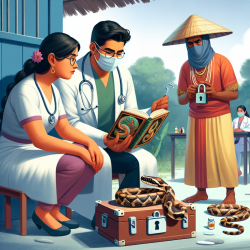The study titled "Barriers to the hospital treatment among Bede snake charmers in Bangladesh with special reference to venomous snakebite" provides a comprehensive look into the challenges faced by a unique community in accessing effective medical care. The Bede, a nomadic ethnic group in Bangladesh, are traditionally involved in snake-related occupations such as snake charming. Despite their proximity to snakes, they face significant barriers in accessing biomedical treatment for snakebites.
The 4As: Accessibility, Affordability, Availability, and Acceptability
The research identifies four critical barriers—Accessibility, Affordability, Availability, and Acceptability—that prevent many Bede from seeking biomedical treatment for snakebites. Understanding these barriers is crucial for practitioners looking to improve healthcare delivery in similar contexts.
- Accessibility: Geographic distance and lack of transportation hinder timely access to hospitals.
- Affordability: High costs of medical care and lack of health insurance make treatment financially inaccessible.
- Availability: Limited availability of antivenom and medical facilities restricts effective treatment options.
- Acceptability: Social stigma and discrimination deter the Bede from seeking modern medical care.
The Role of Traditional Medicine
The Bede community relies heavily on traditional medicine practices due to these barriers. However, the effectiveness of such treatments is not scientifically validated. Practitioners can benefit from understanding these cultural practices to better integrate traditional knowledge with modern medical approaches.
Opportunities for Collaboration
The research suggests that partnerships between the public health sector and the Bede community could significantly improve outcomes. By collaborating with traditional healers and providing education on the benefits of biomedical treatments, practitioners can help bridge the gap between traditional and modern medicine.
Encouraging Further Research
This study opens avenues for further research into culturally sensitive healthcare delivery models. Practitioners are encouraged to explore how similar barriers affect other communities globally and develop strategies that incorporate both traditional and biomedical approaches.
Conclusion
The insights from this research highlight the importance of understanding cultural contexts in healthcare delivery. By addressing the identified barriers and fostering collaboration between traditional and modern medicine, practitioners can enhance their skills and improve health outcomes for marginalized communities like the Bede.
To read the original research paper, please follow this link: Barriers to the hospital treatment among Bede snake charmers in Bangladesh with special reference to venomous snakebite.










